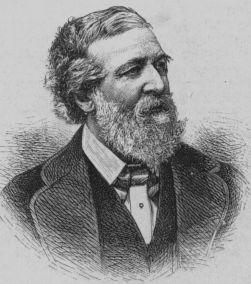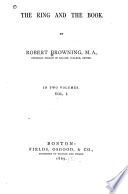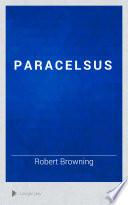Works
Rabbi ben Ezra
Robert BrowningSordello
Robert Browning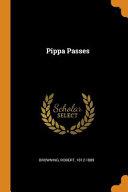
Pippa Passes
Robert BrowningColombe's Birthday
Robert BrowningBy the Fireside
Robert BrowningCleon
Robert BrowningA Blot in the 'Scutcheon
Robert BrowningMemorabilia
Robert Browning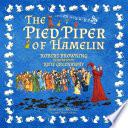
The Pied Piper of Hamelin
Robert BrowningAfter
Robert Browning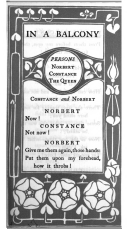
In a Balcony
Robert BrowningFamous Robert Browning Quotes

"A Grammarian's Funeral", line 115.
Men and Women (1855)
Context: That low man seeks a little thing to do,
Sees it and does it.
This high man, with a great thing to pursue,
Dies ere he knows it.
That low man goes on adding one to one,—
His hundred's soon hit;
This high man, aiming at a million,
Misses an unit.
That has the world here—should he need the next,
Let the world mind him!
This throws himself on God, and unperplexed
Seeking shall find him.
“Who hears music feels his solitude
Peopled at once.”
Balaustion's Adventure, line 323 (1871).
Source: The complete poetical works of Browning
Source: Dramatis Personae (1864), Rabbi Ben Ezra, Line 121.
Context: Be there, for once and all,
Severed great minds from small,
Announced to each his station in the Past!
Was I, the world arraigned,
Were they, my soul disdained,
Right? Let age speak the truth and give us peace at last!
Now, who shall arbitrate?
Ten men love what I hate,
Shun what I follow, slight what I receive;
Ten, who in ears and eyes
Match me: we all surmise,
They this thing, I that: whom shall my soul believe?
Robert Browning Quotes about God
“If you get simple beauty and naught else,
You get about the best thing God invents.”
"Fra Lippo Lippi", line 217.
Men and Women (1855)
Source: The Poems of Robert Browning
Source: Dramatis Personae (1864), Rabbi Ben Ezra, Line 1.
Context: Grow old along with me!
The best is yet to be,
The last of life, for which the first was made:
Our times are in his hand
Who saith, "A whole I planned,
Youth shows but half; trust God: see all, nor be afraid!"
A Soul's Tragedy (1846), Act. i.
Robert Browning Quotes about life
As quoted in Love's Way (1918) by Orison Swett Marden, p. 175; no earlier citation of this to Browning has been located.
Disputed
Variant: Love is energy of life.
Book I : The Ring and the Book.
The Ring and the Book (1868-69)
“But how carve way i' the life that lies before,
If bent on groaning ever for the past?”
Balaustion's Adventure.
Bartlett's Familiar Quotations, 10th ed. (1919)
"Saul", ix.
Dramatic Romances and Lyrics (1845)
After.
Bartlett's Familiar Quotations, 10th ed. (1919)
Robert Browning: Trending quotes
Book the First
Sordello (1840)
“As if true pride
Were not also humble!”
In an Album.
Bartlett's Familiar Quotations, 10th ed. (1919)
“He said true things, but called them by the wrong names.”
Source: Men and Women (1855) "Bishop Blougram's Apology", line 996.
Robert Browning Quotes
“Any nose
May ravage with impunity a rose.”
Book the Sixth
Sordello (1840)
“Perhaps one has to be very old before one learns to be amused rather than shocked.”
Not Browning, but a misquotation from Pearl Buck's China, Past and Present: "Ah well, perhaps one has to be very old before one learns how to be amused rather than shocked".
Misattributed
House, x.
Bartlett's Familiar Quotations, 10th ed. (1919)
“Good, to forgive;
Best, to forget!
Living, we fret;
Dying, we live.”
Dedication to La Saisiaz.
Bartlett's Familiar Quotations, 10th ed. (1919)
Valence of Prince Berthold, in Act IV.
Colombe's Birthday (1844)
Context: p>He gathers earth's whole good into his arms;
Standing, as man now, stately, strong and wise,
Marching to fortune, not surprised by her.
One great aim, like a guiding-star, above—
Which tasks strength, wisdom, stateliness, to lift
His manhood to the height that takes the prize;
A prize not near — lest overlooking earth
He rashly spring to seize it — nor remote,
So that he rest upon his path content:
But day by day, while shimmering grows shine,
And the faint circlet prophesies the orb,
He sees so much as, just evolving these,
The stateliness, the wisdom and the strength,
To due completion, will suffice this life,
And lead him at his grandest to the grave.
After this star, out of a night he springs;
A beggar's cradle for the throne of thrones
He quits; so, mounting, feels each step he mounts,
Nor, as from each to each exultingly
He passes, overleaps one grade of joy.
This, for his own good: — with the world, each gift
Of God and man, — reality, tradition,
Fancy and fact — so well environ him,
That as a mystic panoply they serve —
Of force, untenanted, to awe mankind,
And work his purpose out with half the world,
While he, their master, dexterously slipt
From such encumbrance, is meantime employed
With his own prowess on the other half.
Thus shall he prosper, every day's success
Adding, to what is he, a solid strength —
An aery might to what encircles him,
Till at the last, so life's routine lends help,
That as the Emperor only breathes and moves,
His shadow shall be watched, his step or stalk
Become a comfort or a portent, how
He trails his ermine take significance, —
Till even his power shall cease to be most power,
And men shall dread his weakness more, nor dare
Peril their earth its bravest, first and best,
Its typified invincibility.Thus shall he go on, greatening, till he ends—
The man of men, the spirit of all flesh,
The fiery centre of an earthly world!</p
Book the First
Sordello (1840)
Context: But, gathering in its ancient market-place,
Talked group with restless group; and not a face
But wrath made livid, for among them were
Death's staunch purveyors, such as have in care
To feast him. Fear had long since taken root
In every breast, and now these crushed its fruit,
The ripe hate, like a wine: to note the way
It worked while each grew drunk! men grave and grey
Stood, with shut eyelids, rocking to and fro.
Letting the silent luxury trickle slow
About the hollows where a heart should be;
But the young gulped with a delirious glee
Some foretaste of their first debauch in blood
At the fierce news
Source: Dramatis Personae (1864), Rabbi Ben Ezra, Line 121.
Context: Be there, for once and all,
Severed great minds from small,
Announced to each his station in the Past!
Was I, the world arraigned,
Were they, my soul disdained,
Right? Let age speak the truth and give us peace at last!
Now, who shall arbitrate?
Ten men love what I hate,
Shun what I follow, slight what I receive;
Ten, who in ears and eyes
Match me: we all surmise,
They this thing, I that: whom shall my soul believe?
"Andrea del Sarto", line 70
"Less is more" is often misattributed to architects Buckminster Fuller or Ludwig Mies van der Rohe. It is something of a motto for minimalist philosophy. It was used in 1774 by Christoph Martin Wieland.
Men and Women (1855)
Context: I do what many dream of, all their lives,
— Dream? strive to do, and agonize to do,
And fail in doing. I could count twenty such
On twice your fingers, and not leave this town,
Who strive — you don't know how the others strive
To paint a little thing like that you smeared
Carelessly passing with your robes afloat —
Yet do much less, so much less, Someone says,
(I know his name, no matter) — so much less!
Well, less is more, Lucrezia: I am judged.
There burns a truer light of God in them,
In their vexed beating stuffed and stopped-up brain,
Heart, or whate'er else, than goes on to prompt
This low-pulsed forthright craftsman's hand of mine.
Book IX : Juris Doctor Johannes-Baptista Bottinius, Fisci et Rev. Cam. Apostol. Advocatus.
The Ring and the Book (1868-69)
Context: Forgive me this digression — that I stand
Entranced awhile at Law's first beam, outbreak
O' the business, when the Count's good angel bade
"Put up thy sword, born enemy to the ear,
"And let Law listen to thy difference!"
And Law does listen and compose the strife,
Settle the suit, how wisely and how well!
On our Pompilia, faultless to a fault,
Law bends a brow maternally severe,
Implies the worth of perfect chastity,
By fancying the flaw she cannot find.
Valence of Prince Berthold, in Act IV.
Colombe's Birthday (1844)
Context: p>He gathers earth's whole good into his arms;
Standing, as man now, stately, strong and wise,
Marching to fortune, not surprised by her.
One great aim, like a guiding-star, above—
Which tasks strength, wisdom, stateliness, to lift
His manhood to the height that takes the prize;
A prize not near — lest overlooking earth
He rashly spring to seize it — nor remote,
So that he rest upon his path content:
But day by day, while shimmering grows shine,
And the faint circlet prophesies the orb,
He sees so much as, just evolving these,
The stateliness, the wisdom and the strength,
To due completion, will suffice this life,
And lead him at his grandest to the grave.
After this star, out of a night he springs;
A beggar's cradle for the throne of thrones
He quits; so, mounting, feels each step he mounts,
Nor, as from each to each exultingly
He passes, overleaps one grade of joy.
This, for his own good: — with the world, each gift
Of God and man, — reality, tradition,
Fancy and fact — so well environ him,
That as a mystic panoply they serve —
Of force, untenanted, to awe mankind,
And work his purpose out with half the world,
While he, their master, dexterously slipt
From such encumbrance, is meantime employed
With his own prowess on the other half.
Thus shall he prosper, every day's success
Adding, to what is he, a solid strength —
An aery might to what encircles him,
Till at the last, so life's routine lends help,
That as the Emperor only breathes and moves,
His shadow shall be watched, his step or stalk
Become a comfort or a portent, how
He trails his ermine take significance, —
Till even his power shall cease to be most power,
And men shall dread his weakness more, nor dare
Peril their earth its bravest, first and best,
Its typified invincibility.Thus shall he go on, greatening, till he ends—
The man of men, the spirit of all flesh,
The fiery centre of an earthly world!</p
Book I : The Ring and the Book.
The Ring and the Book (1868-69)
Context: Gold as it was, is, shall be evermore:
Prime nature with an added artistry —
No carat lost, and you have gained a ring.
What of it? 'T is a figure, a symbol, say;
A thing's sign: now for the thing signified.
Book I : The Ring and the Book.
The Ring and the Book (1868-69)
“My times be in thy hand!
Perfect the cup as planned!”
Source: Dramatis Personae (1864), Rabbi Ben Ezra, Line 187.
Context: So, take, and use thy work:
Amend what flaws may lurk,
What strain o' the stuff, what warpings past the aim!
My times be in thy hand!
Perfect the cup as planned!
Let age approve of youth, and death complete the same!
“So men believe
And worship what they know not, nor receive
Delight from.”
Book the Second
Sordello (1840)
“Inscribe all human effort with one word,
Artistry's haunting curse, the Incomplete!”
Book XI, line 1560.
The Ring and the Book (1868-69)
Valence of Prince Berthold, in Act IV.
Colombe's Birthday (1844)
Context: p>He gathers earth's whole good into his arms;
Standing, as man now, stately, strong and wise,
Marching to fortune, not surprised by her.
One great aim, like a guiding-star, above—
Which tasks strength, wisdom, stateliness, to lift
His manhood to the height that takes the prize;
A prize not near — lest overlooking earth
He rashly spring to seize it — nor remote,
So that he rest upon his path content:
But day by day, while shimmering grows shine,
And the faint circlet prophesies the orb,
He sees so much as, just evolving these,
The stateliness, the wisdom and the strength,
To due completion, will suffice this life,
And lead him at his grandest to the grave.
After this star, out of a night he springs;
A beggar's cradle for the throne of thrones
He quits; so, mounting, feels each step he mounts,
Nor, as from each to each exultingly
He passes, overleaps one grade of joy.
This, for his own good: — with the world, each gift
Of God and man, — reality, tradition,
Fancy and fact — so well environ him,
That as a mystic panoply they serve —
Of force, untenanted, to awe mankind,
And work his purpose out with half the world,
While he, their master, dexterously slipt
From such encumbrance, is meantime employed
With his own prowess on the other half.
Thus shall he prosper, every day's success
Adding, to what is he, a solid strength —
An aery might to what encircles him,
Till at the last, so life's routine lends help,
That as the Emperor only breathes and moves,
His shadow shall be watched, his step or stalk
Become a comfort or a portent, how
He trails his ermine take significance, —
Till even his power shall cease to be most power,
And men shall dread his weakness more, nor dare
Peril their earth its bravest, first and best,
Its typified invincibility.Thus shall he go on, greatening, till he ends—
The man of men, the spirit of all flesh,
The fiery centre of an earthly world!</p
Source: Dramatis Personae (1864), Rabbi Ben Ezra, Line 142.
Context: All instincts immature,
All purposes unsure,
That weighed not as his work, yet swelled the man's amount:
Thoughts hardly to be packed
Into a narrow act,
Fancies that broke through language and escaped;
All I could never be,
All, men ignored in me,
This, I was worth to God, whose wheel the pitcher shaped.
"Home-Thoughts, from Abroad", line 1.
Dramatic Romances and Lyrics (1845)
“Autumn wins you best by this its mute
Appeal to sympathy for its decay.”
Part 1.
Paracelsus (1835)
Book X : The Pope.
The Ring and the Book (1868-69)
Context: What wonder if the novel claim had clashed
With old requirement, seemed to supersede
Too much the customary law? But, brave,
Thou at first prompting of what I call God,
And fools call Nature, didst hear, comprehend,
Accept the obligation laid on thee,
Mother elect, to save the unborn child,
As brute and bird do, reptile and the fly,
Ay and, I nothing doubt, even tree, shrub, plant
And flower o' the field, all in a common pact
To worthily defend the trust of trusts,
Life from the Ever Living: — didst resist —
Anticipate the office that is mine —
And with his own sword stay the upraised arm,
The endeavour of the wicked, and defend
Him who, — again in my default, — was there
For visible providence: one less true than thou
To touch, i' the past, less practised in the right,
Approved less far in all docility
To all instruction, — how had such an one
Made scruple "Is this motion a decree?"
“O lyric Love, half angel and half bird
And all a wonder and a wild desire”
Book I : The Ring and the Book <!-- line 1391 -->.
The Ring and the Book (1868-69)
Context: O lyric Love, half angel and half bird
And all a wonder and a wild desire, —
Boldest of hearts that ever braved the sun,
Took sanctuary within the holier blue,
And sang a kindred soul out to his face, —
Yet human at the red-ripe of the heart—
When the first summons from the darkling earth
Reached thee amid thy chambers, blanched their blue,
And bared them of the glory — to drop down,
To toil for man, to suffer or to die, —
This is the same voice: can thy soul know change?
Hail then, and hearken from the realms of help!
“Each a God's germ, but doomed remain a germ
In unexpanded infancy”
Book the Third
Sordello (1840)
“Have you found your life distasteful?
My life did and does smack sweet.”
"At the 'Mermaid'"(1876) <!-- line 72 - 80 -->
Context: Have you found your life distasteful?
My life did and does smack sweet.
Was your youth of pleasure wasteful?
Mine I save and hold complete.
Do your joys with age diminish?
When mine fail me, I'll complain.
Must in death your daylight finish?
My sun sets to rise again.
Book X: The Pope.<!-- line 1235 -->
The Ring and the Book (1868-69)
“Rats!
They fought the dogs and killed the cats”
The Pied Piper of Hamelin, line 10 (1842).
Context: Rats!
They fought the dogs and killed the cats,
And bit the babies in the cradles,
And ate the cheeses out of the vats,
And licked the soup from the cooks' own ladles,
Split open the kegs of salted sprats,
Made nests inside men's Sunday hats,
And even spoiled the women's chats
By drowning their speaking
With shrieking and squeaking
In fifty different sharps and flats.
“Let us cry, "All good things
Are ours, nor soul helps flesh more, now, than flesh helps soul!"”
Source: Dramatis Personae (1864), Rabbi Ben Ezra, Line 70.
“Mine be some figured flame which blends, transcends them all!”
Source: Dramatis Personae (1864), Rabbi Ben Ezra, Line 12.
Context: Mine be some figured flame which blends, transcends them all!
Not for such hopes and fears
Annulling youth's brief years,
Do I remonstrate: folly wide the mark!
Rather I prize the doubt
Low kinds exist without,
Finished and finite clods, untroubled by a spark.
Poor vaunt of life indeed,
Were man but formed to feed
On joy, to solely seek and find and feast;
Such feasting ended, then
As sure an end to men.
"Andrea del Sarto", line 70
"Less is more" is often misattributed to architects Buckminster Fuller or Ludwig Mies van der Rohe. It is something of a motto for minimalist philosophy. It was used in 1774 by Christoph Martin Wieland.
Men and Women (1855)
Context: I do what many dream of, all their lives,
— Dream? strive to do, and agonize to do,
And fail in doing. I could count twenty such
On twice your fingers, and not leave this town,
Who strive — you don't know how the others strive
To paint a little thing like that you smeared
Carelessly passing with your robes afloat —
Yet do much less, so much less, Someone says,
(I know his name, no matter) — so much less!
Well, less is more, Lucrezia: I am judged.
There burns a truer light of God in them,
In their vexed beating stuffed and stopped-up brain,
Heart, or whate'er else, than goes on to prompt
This low-pulsed forthright craftsman's hand of mine.
“Rather I prize the doubt
Low kinds exist without,
Finished and finite clods, untroubled by a spark.”
Source: Dramatis Personae (1864), Rabbi Ben Ezra, Line 12.
Context: Mine be some figured flame which blends, transcends them all!
Not for such hopes and fears
Annulling youth's brief years,
Do I remonstrate: folly wide the mark!
Rather I prize the doubt
Low kinds exist without,
Finished and finite clods, untroubled by a spark.
Poor vaunt of life indeed,
Were man but formed to feed
On joy, to solely seek and find and feast;
Such feasting ended, then
As sure an end to men.
“I find earth not gray but rosy;
Heaven not grim but fair of hue.”
"At the 'Mermaid'"(1876).
Context: I find earth not gray but rosy;
Heaven not grim but fair of hue.
Do I stoop? I pluck a posy; Do I stand and stare? All's blue.
“Ah, but a man's reach should exceed his grasp,
Or what's a heaven for?”
"Andrea del Sarto", line 98.
Men and Women (1855)
Source: Men and Women and Other Poems
“We loved, sir — used to meet:
How sad and bad and mad it was —
But then, how it was sweet!”
"Confessions", line 34 (1864).
“Take away love, and our earth is a tomb!”
"Fra Lippo Lippi, line 54.
Men and Women (1855)
Variant: Without love, our earth is a tomb
“When the fight begins within himself,
A man's worth something.”
"Bishop Blougram's Apology".
Men and Women (1855)
“Love, hope, fear, faith - these make humanity; These are its sign and note and character”
Source: Browning's Paracelsus: Being the Text of Browning's Poem
“Stung by the splendour of a sudden thought.”
Source: A Death in the Desert (1864), Line 59.
Source: Dramatic Lyrics
"Bishop Blougram’s Apology", line 395; cited by Graham Greene as the epigraph he would choose for his novels.
Men and Women (1855)
“Open my heart and you will see
Graved inside of it, "Italy".”
"De Gustibus", ii.
Men and Women (1855)
Context: Italy, my Italy!
Queen Mary's saying serves for me
(When fortune's malice
Lost her Calais):
"Open my heart, and you will see
Graved inside of it ‘Italy.'"
“What Youth deemed crystal,
Age finds out was dew.”
"Jochanan Hakkadosh" (1883).
Source: Jocoseria
